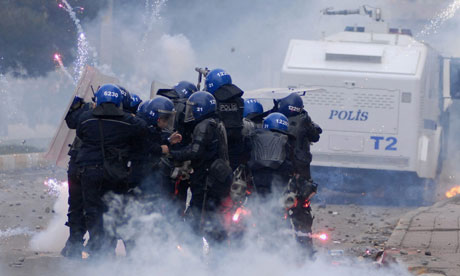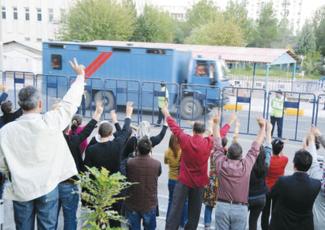
FURTHER DESTRUCTION OF IRAQ’S HIGHER EDUCATION
December 2011 choose your language: NEDERLANDS ESPAÑOL ARABIC
Sanctions, Occupation and the Struggle for Higher Education in Iraq
read more: here
THE BRUSSELLS TRIBUNAL
is an international network of intellectuals, artists and activists, who denounce the logic of permanent war promoted by the American government and its allies, affecting for the time being particularly one region in the world: the Middle East. It started with a people’s court against the Project for a New American Century (PNAC) and its role in the illegal invasion of Iraq, but continued ever since. It tries to be a bridge between the intellectual resistance in the Arab World and the Western peace movements
|
You can support the BRussells
Tribunal. It relies entirely on volunteers, but has expenses for
telephone calls, website hosting, mailings, subscriptions,
international contacts, etc. It counts on your support to remain
independent and to continue its work. You can support us
financially by donation: Click
here
to immediately pay a
contribution. |
|
|
Transfer via your bank to the
account of the BRussells Tribunal 132-5251479-37 (IBAN:
BE35 1325 2514 7937 – BIC: BNAGBEBB) with reference: "supporting
member 2012" or "honorary-supporting member 2010".
You're a
supporting member in 2010 when you donate at least € 50. You're
an honorary-supporting member in 2012 when you donate at least €
1000 |
|
FURTHER DESTRUCTION OF IRAQ’S HIGHER EDUCATION:
Blazing fires, forged degrees and silencer guns
Dirk Adriaensens - 1
December 2011
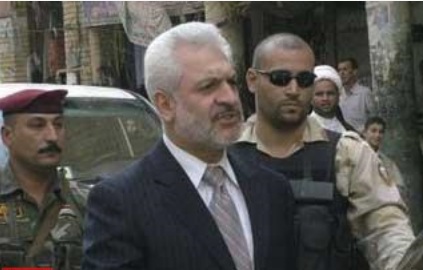 Ali Al Adeeb, Minister of Higher Education |
“Fire and gunpowder do not sleep together”….
except in Iraq. |
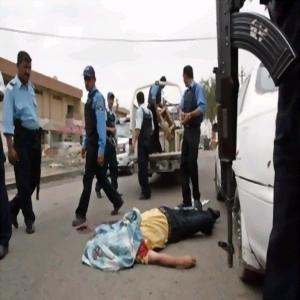 A college professor found dead in Diyala – June,2011 |
The road to hell is paved with good intentions
Al-Adeeb's views echoed comments made from 9-11 March 2011 by Hans-Christoph
von Sponeck, former UN humanitarian coordinator for Iraq, who told a
Ghent University conference on the country's disastrous education
situation, organized by the BRussells
Tribunal and MENARG[3],
that "Iraq's former pride, its education system, has collapsed".[4]
On 30 November Ali al-Adeeb, discussed with the Canadian ambassador to
Baghdad procedures to accept Iraqi students in Canadian universities.
The Minister intends to send 10,000 students to study abroad to meet the
needs of the country to different specializations. The ambassador
expressed the readiness of Canada to facilitate the acceptance of Iraqi
students.[5]
On 29 November it was reported that Representatives of Oregon State
University and Iraq’s Ministry of Higher Education and Scientific
Research had signed a memorandum of understanding that will bring
hundreds of faculty and students to OSU from Iraq for training and
research opportunities.
On 23 October Ali al-Adeeb received a Russian delegation. He then called
on Russia to increase its scientific and cultural cooperation with Iraq.
Adeeb called for increasing the number of Iraqi students to be accepted
in the Russian universities, particularly in the engineering studies.[6]
Shiny plans and beautiful words. But the situation on the ground shows a
completely different reality.
The Minister of Higher Education: a fox in the hen house ?
Who is Ali Al Adeeb? Ali al-Adeeb is a senior member of the Islamic Dawa
Party. He returned from exile in Iran to Iraq in 2003 on the back of
American tanks. In April 2006 he was tipped as a candidate for the post
of Prime Minister. Al-Adeeb was also appointed to the committee that
drafted the illegal Constitution of Iraq under occupation in 2005. Ali
Al Adeeb (real name Ali Akbar Zandi?) is believed to have a brother in
the Iranian Shura Council, according to Iraqi sources.
Ali Al Adeeb is obliged to send his students abroad because soon there
will be no qualified University lecturers left in Iraq to teach the
students.
Here’s the story.
Blazing Fires, Forged Degrees
Silencer Guns
On the early morning of 31 July 2011, a group of unknown armed men
assassinated the Director-General of Administration in Iraq’s Ministry
of Higher Education & Scientific Research—Dawood Salman Rahim and his
son, Hassanein—as they drove in their car in west Baghdad’s Ghazaliya
district.[12]
Dr Rahim told his friends that he might get killed because he refused a
request of Ali Al-Adeeb to equate the Shia Hawza religion certificates
with the Scientific PhD certificates. Dr Rahim asked the minister to
give him a written authorisation to do so. The minister threatened him
to force his collaboration in this issue. Security officers of the
Ministry raided his house two days before his assassination, and took
his car registration certificate, and his rationing ticket. He was
assassinated by silencer gun two days after the raid.
Iraqi sources claim that even Ali Al-Adeeb’s diploma has been forged.
His diploma certificate was issued on 30-09-2010, after his appointment
as minister, and it shows that he had graduated from the College of
Education/Baghdad University on 30/06/1965, meaning he was 19 years old,
as he was born in 1946, and this is impossible in Iraq.
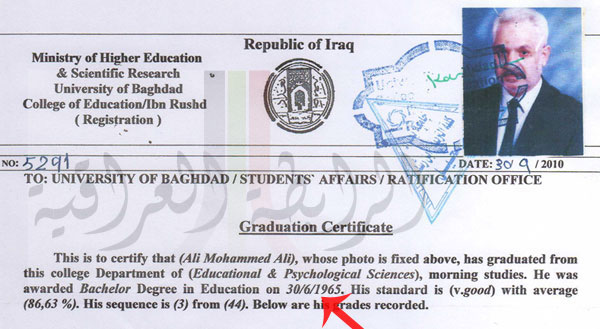 |
Ali Al Adeeb’s virulent sectarianism and selective deba’athification
Hundreds of people have recently been arrested all around Iraq in an
operation launched by the security forces against members of the banned
Ba’ath party. The crackdown started in October 2011 when the Ministry of
Higher Education went after members of Tikrit University in Salahaddin.
That was quickly followed by a wave of detentions across six of Iraq’s
eighteen provinces. By early November, the government announced that 655
former Baathists had been picked up.[13]
Within his department, Ali al-Adeeb, the second man in Maliki’s Dawa
party, started applying a virulent anti-Ba’athist agenda since he came
into office.[14]
Iraq commentator Reidar Visser refers to the "selective
de-Ba'athification" process being pursued in Iraq.
" It is a historical fact that Shiites and Sunnis alike cooperated with
the old regime in their millions, and it was for example Shiite tribes
that cracked down on the “Shiite” rebellion in the south in 1991.
Nonetheless, the exiles who returned to Iraq after 2003 have tried to
impose an artificial narrative in which the legacy of pragmatic
cooperation with the Baathist regime is not dealt with in a systematic
and neutral fashion as such; instead one singles out political opponents
(often Sunnis) as “Baathists” and silently co-opt political friends
(especially if they happen to be Shiites) without mentioning their
Baathist ties at all. The result is a hypocritical and sectarian
approach to the whole question of de-Ba’athification that will create a
new Iraq on shaky foundations. (For example, the Sadrists have been in
the lead in the aggressive de-Ba’athification campaign, yet it is well
known that many Sadrists in fact had Baathist ties in the past.)"[15]
Uprooting the remnants of Iraq's intellectual class
The President of Tikrit University resigned on 14 October 2011 after the
sacking of 300 university lecturers by Ali Al-Adeeb, 140 employees and
professors at the University of Tikrit alone[16].
The President of the University stated that they were all very good
lecturers. Iraqi sources claim that the Minister of Higher Education has
discharged some 1.200 lecturers since he became a Minister. Ali Al-Adeeb
also wanted to impose Islamic law in Iraqi universities through the
imposition of sectarianism and the veil and the separation of the sexes,
leading to discontent in university circles.
The number of prominent Iraqi academics and professionals who fled the
country surpass 20,000. Of the 6700 Iraqi professors who have fled since
2003, the Los Angeles Times reported in October 2008 that only 150 of
them had returned[17].
But it’s not safe to return. The BRussells
Tribunal warned already on 26 April 2009, that “those
academics who return are finding jobs few and the welcome far from warm”[18].
The statement further alarmed the academics who are invited or forced to
return, to be aware of criminal acts like kidnappings or assassinations.[19]
Since the US-led invasion in 2003, Iraq’s intellectual and technical
class has been subject to a systematic and on-going campaign of
intimidation, abduction, extortion, random killings and targeted
assassinations. To this date there has been no systematic investigation
into the assassination of hundreds of University professors. And now Ali
Al Adeeb is eliminating what’s left of Iraq’s intellectual capital. This
equals
Educide[20]:
the annihilation of education.
The current Iraqi government has a policy of excluding experienced
professors, and replace them with people with party affiliations, or
some other ignorant people with fake university qualifications. But
discharging capable professors seems not enough for Mr Al-Adeeb. Many
Iraqi academics are obliged to retire against their will because the
government orders them to do so, while they are at the height of their
capacities. The situation of the Iraqi academics abroad is also dire,
because the ones who live in Europe, the US and Asia lost their
retirement rights in Iraq, thus hundreds of them have no income because
they are deprived from their retirement rights in their country.
Death Squads inside the Ministry of Higher Education?
www.iraqirabita.org
reported on 17 November that Ali Al Adeeb is running a sectarian shia
death squad, whose main duty is to exterminate Sunni Iraqi academics and
Sunni officers and policemen from the former government. The death squad
is called Asaaib Ahl Al Haq, active in Baghdad – Al Thawra area, and run
by Ali Al Adeeb himself, directly supervised by his Office Manager,
Majid Al Gharrawi, who has a leading role in the recent arrests. The
death squad receives information from the Office Manager of Al Adeeb
about students and professors from Bab Al Muadam Universities Compound
and Al Mustansiriyah University, who allegedly have Baath links, or who
are Sunni, in order to kidnap and assassinate them. Many employees in
the Ministry of High Education have fake Iraqi names, cooperating
directly with the Iranian intelligence, according to Iraqirabita.
The result is that even more professors flee the country. An Iraqi
newspaper told the story about a college professor who got shot in the
head and was brought to the hospital in a critical condition, but he
survived. He was shouting: “please, if I die, do not let anyone leave my
wife and daughters in the streets”. This is because Iraqi academics, or
anyone of the educational or teaching staff, usually don’t possess a
house of their own. They rent houses, or live with their families in
miserable conditions. Whenever they ask the government for a piece of
land to build a house, or loans to buy a house, they face an endless
routine of governmental procedures that might take years. So they are
lost in a way or another, and their families are lost too, whether
through the assassinations and the continuous fears they live in, or
through the terrible treatment by the government.
An Iraqi professor in exile in Amman states: “we are all here in Amman.
We cannot go back to Iraq and resume our profession, it seems that we
are not only imprisoned in our country, but also in the country we are
in now, because there are not enough places for us in colleges here.” An
Iraqi student who also escaped Iraq testifies: “we cannot complete our
studies in Jordanian colleges, because there is no one to help or
support us. We feel disappointed because many Arab students, especially
the Jordanians, studied in Iraq for free many years ago, and now we have
no one to help us during these hard times.”
|
Dirk Adriaensens
is a member of the BRussells
Tribunal executive Committee. |
Additional writing: Dr. Sami Zemni and Dr. Christopher Parker,
professors at Ghent University.
[2]
Wagdy Sawahel:
http://www.universityworldnews.com/article.php?story=20111013231806586&mode=print
[3]
Middle East North Africa Research Group at Ghent University:
http://www.menarg.ugent.be/
[4]
http://www.brussellstribunal.org/Seminar/texts/en/2.pdf
and
http://www.newint.org/features/web-exclusive/2011/04/20/iraq-educide/
[15]
Reidar Visser in
http://gulfanalysis.wordpress.com/2010/01/08/why-ad-hoc-de-baathification-will-derail-the-process-of-democratisation-in-iraq/
[17]
James Petras in
http://forum.prisonplanet.com/index.php?topic=128725.0
[19]
See the list of assassinated academics:
http://www.brussellstribunal.org/academicsList.htm
[20]
Educide
is a concept introduced by Hans-Christoph von Sponeck, former UN
Humanitarian Coordinator for Iraq, in his keynote speech at
Ghent University Conference, which examined the ongoing
catastrophe of the Iraqi academia and the country’s disastrous
education situation, in March 2011.
Hans Christof von Sponeck – march 2011
Iraq’s former pride, its education system, has collapsed.
The international seminar in Ghent was a significant first step in determining whether the extrajudicial killings, abductions, forced displacement of Iraqi academics and other professionals, the destruction of the educational infrastructure, during the war and subsequent occupation, are indeed a case of pre-meditated elimination of Iraq’s intellectual elite and education system, and could constitute “Educide”.
This word has yet to enter the international dictionary of crimes; it is a composite of education and genocide which the author has combined to refer to genocide of the educated segments of Iraqi society.
It can only
be hoped that both the International Court of Justice
and the International Criminal Court will pursue the question of
possible educide in Iraq.
|
Hans Christof von Sponeck
is former UN assistant of the Secretary General of the United
Nations, member of the Advisory Committee of the BRussells
Tribunal |
(The
full article by Hans von Sponeck "Iraq: A Case of Educide?" You
can read it in the book BEYOND EDUCIDE.)![]()
BEYOND EDUCIDE
Sanctions, Occupation and the Struggle for Higher Education in Iraq
Recommendations of the International Seminar on the Situation of Iraqi
Academics
March 9/10/11, 2011 Ghent University
YOUR COPY
HERE
From 9-12 March 2011 the BRussells
Tribunal and the Middle East North Africa Research Group (MENARG)
organized a 4-day seminar in Ghent University titled: “Defending
education in times of war and occupation”.
The conference started from the premise that the educational crisis can
only be addressed with an awareness of the general situation.
Nevertheless, the urgent task of the seminar was not so much to give
reasons for the destruction of Iraqi academia, but rather to propose
ways of rebuilding its rich traditions, and restoring its potential for
future contributions. The conference also highlighted the duty of
international organisations to respond, and the responsibility of
non-Iraqi educators to stand in solidarity with their Iraqi
counterparts. The international academic community should be more aware
of the on-going nature of the crimes against Iraqi academics, and
encouraged to participate in the proposing and exploring of practical
remedies. We thus set out to articulate a set of well-formulated
recommendations that can strengthen both academic understanding and
activists’ engagement.
-
A brief introduction
Sami Zemni & Christopher Parker
-
Objectives of the Seminar
Saad Naji Jawad
-
The Ghent Charter in defense of Iraqi Academia
Signatories
-
The Current state of Iraqi higher and general education
Saad Naji Jawad
-
Iraq: A case of Educide?
Hans von Sponeck
-
Continuing deconstruction of higher education in Mesopotamia.
1)
“A brain is a
terrible thing to waste”
2)
Blazing
fires, fake degrees and silencer guns
Dirk Adriaensens, BRussells Tribunal
-
RECOMMENDATIONS FOR AMENDING THE SITUATION OF EDUCATION INSIDE IRAQ
-
Statement of Principles
o
Introduction
and overview
1.
The political
context: education between human rights & the challenge of sectarianism
2.
Security
3.
Issues of
fraud and crime
4.
Issues of
curricula, collaborations, content and scholarships
5.
Management of
education, in- and outside communication & infrastructure
-
Ending the culture of impunity
-
RECOMMENDATIONS FOR AMENDING THE SITUATION OF IRAQI ACADEMICS IN THE
DIASPORA
-
Statement of Principles
-
Introduction and overview
1.
Legal, Civil
& Human Rights Issues
2.
Issues of
Representation and Mobilization
3.
Solidarity
and Political Gesture
-
State-Ending and the Illusions of Empire
Raymond William Baker
This book hopes to do more than simply provide the international academic community, the wider public and the relevant institutions with access to knowledge about the destruction of Iraq, and the plight of Iraqi academia and academics in particular. It also seeks to provide a starting point for those who stand in solidarity with Iraqi academics, and who seek to promote education in general, to propose and discuss practical means of helping Iraqis recover their rights to education, and of defending Iraqi academics. In particular, this book and other outcomes of the Ghent Seminar enable educational leaders —deans, professors, department heads as well as administrators — to establish a practical network of opportunity for displaced Iraqi academics, thus helping to sustain and rebuild what remains of Iraqi academia outside Iraq.
Finally,
alongside the practical initiatives discussed or adopted, we hope to
reaffirm the responsibility of politicians, governments, civil servants
and associated institutions—at both national and international levels—to
uphold international law, to defend the rights of education embraced by
the United Nations, and to stop the ruthless repression and killing of
Iraqi academics.
As such the
organizers of this initiative seek to take a solid step towards
relieving the suffering of the Iraqi people and participate in the
efforts to propose, map, plan and outline the steps necessary for
rehabilitating Iraq’s educational system.
Iraq is in ruins and so is its higher education system. Beyond the desperate lack of resources, problems include politicization of the
|
BEYOND EDUCIDE
English & Arabic €9
available from January 15, 2012
|
educational system,
uneven emigration and internal displacement of teachers and students,
security threats, and corruption. Illiteracy is widespread in comparison
with previous decades, standing at 39% for the rural population. Almost
22% of the adult population in Iraq has never attended school, and a
mere 9% have secondary school as highest level completed. As far as
gender equity, 47% of women in Iraq are either fully or partly
illiterate, as women’s education suffers from differences across
regions, and especially between the North and South.
The facts on the ground in Iraq show that there is no
“revolution” whatsoever in Iraq’s education system, no major
reconstruction worthy of the name. What we appear to be witnessing is
murder, destruction, corruption and decline.
Without an accurate analysis of the state of Higher Education in Iraq and the fragile security situation in general, no accurate recommendations can be drafted and presented to International and Regional official bodies and human rights organizations. This article is yet again proof of the doublespeak by the Iraqi puppet government and of the dangers the current situation presents for the Iraqi academic community. The BRussells Tribunal has been monitoring the situation in Iraq under occupation very closely. It started the campaign to highlight the plight of Iraqi academics subject to harassment, threats, assassinations, and forced exile. Denis Halliday, former Humanitarian Coordinator for Iraq: “Uncomfortable although it is, (we have) to face the unthinkable, that is, the existence of US policy to end - to terminate - established United Nations card-carrying sovereign states. In the case of Iraq, this policy required US military terrorism, infrastructural destruction and human massacre to create malleability. Malleability, that is, of an intelligentsia focused on sustaining a complex society, and a timeless and intricate culture both essential for the various peoples of Iraq to recognize their unique identity and hard won sense of nation. The (case of) Iraq shows that removal, or enabling the killing of such academic, scientific and established citizens was deemed necessary for state-ending.”
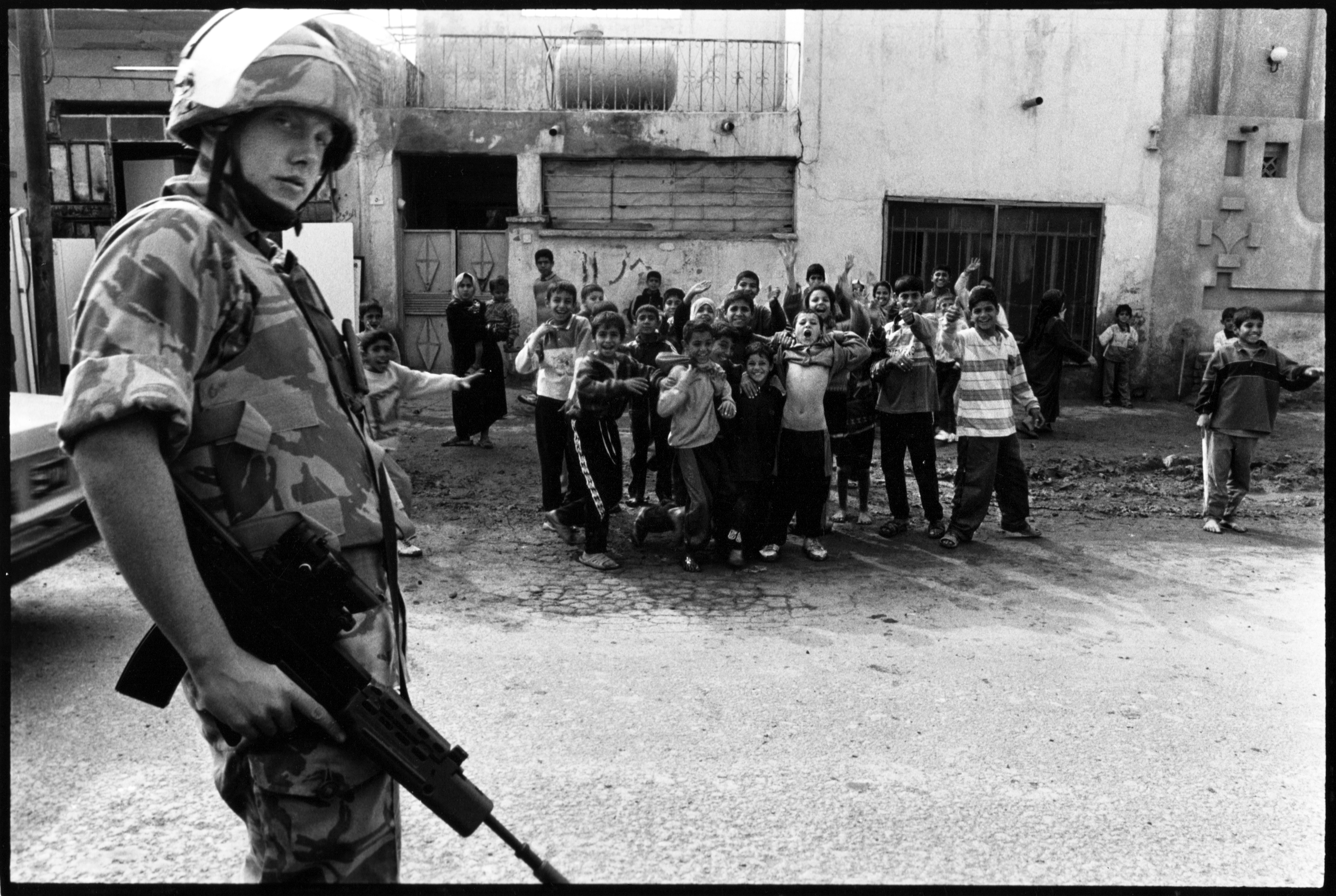 |
BEYOND EDUCIDE
Sanctions, Occupation and the Struggle for Higher Education in Iraq
Recommendations of the International Seminar on the
Situation of Iraqi Academics |
|
BUSH AND BLAIR FOUND GUILTY OF CRIMES AGAINST PEACE IN KUALA
LUMPUR WAR CRIMES TRIBUNAL
A war
crimes tribunal in Malaysia offers a devastating critique of
international criminal law institutions today.
Richard
Falk - 28 November 2011 |
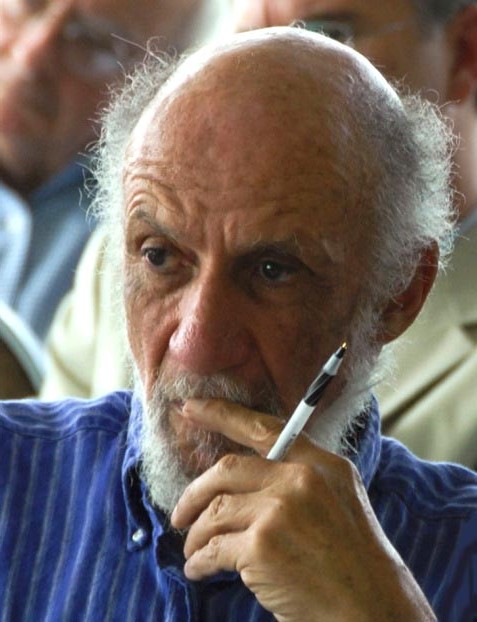 |
||||
|
In Kuala Lumpur, after two
years of investigation by the Kuala Lumpur War Crimes Commission
(KLWCC), a tribunal (the Kuala Lumpur War Crimes Tribunal, or
KLWCT) consisting of five judges with judicial and academic
backgrounds reached a unanimous verdict that found George W Bush
and Tony Blair guilty of crimes against peace, crimes against
humanity, and genocide as a result of their roles in the Iraq
War.
The proceedings took place
over a four-day period from November 19-22, and included an
opportunity for court-appointed defense counsel to offer the
tribunal arguments and evidence on behalf of the absent
defendants. They had been invited to offer their own
The tribunal acknowledged
that its verdict was not enforceable in a normal manner
associated with a criminal court operating within a sovereign
state or as constituted by international agreement, as is the
case with the International Criminal Court. But the KLWCT
followed a juridical procedure purported to operate in a legally
responsible manner. This would endow its findings and
recommendations with a legal weight expected to extend beyond a
moral condemnation of the defendants, but in a manner that is
not entirely evident.
The KLWCT added two
"Orders" to its verdict that had been adopted in accordance with
the charter of the KLWCC that controlled the operating framework
of the tribunal: 1) Report the findings of guilt of the two
accused former heads of state to the International Criminal
Court in The Hague; and 2) Enter the names of Bush and Blair in
the Register of War Criminals maintained by the KLWCC.
The tribunal also added
several recommendations to its verdict: 1) Report findings in
accord with Part VI (calling for future accountability) of the
Nuremberg Judgment of 1945 addressing crimes of surviving
political and military leaders of Nazi Germany; 2) File reports
of genocide and crimes against humanity at the International
Criminal Court in The Hague; 3) Approach the UN General Assembly
to pass a resolution demanding that the United States end its
occupation of Iraq; 4) Communicate the findings of the tribunal
to all members of the Rome Statute (which governs the
International Criminal Court) and to all states asserting
Universal Jurisdiction that allows for the prosecution of
international crimes in national courts; and 5) Urge the UN
Security Council to take responsibility to ensure that full
sovereign rights are vested in the people of Iraq and that the
independence of its government be protected by a UN peacekeeping
force.
Mahathir Mohamed's anti-war
campaign
These civil society legal initiatives are an outgrowth of a longer-term project undertaken by the controversial former Malaysian head of
This vision of a
revitalised struggle against war and post-colonial imperialism
was comprehensively set forth in Mahathir's remarkable anti-war
speech of February 24, 2003, while still prime minister,
welcoming the Non-Aligned Movement to Kuala Lumpur for its
thirteenth summit.
Included in his remarks on
this occasion were the following assertions that prefigure the
establishment of the KLWCC and KLWCT:
"War must be outlawed. That
will have to be our struggle for now. We must struggle for
justice and freedom from oppression, from economic hegemony. But
we must remove the threat of war first. With this sword of
Damocles hanging over our heads we can never succeed in
advancing the interests of our countries.?War must therefore be
made illegal. The enforcement of this must be by multilateral
forces under the control of the United Nations. No single nation
should be allowed to police the world, least of all to decide
what action to take, [and] when."
Mahathir stated clearly on
that occasion that his intention in criminalising the behavior
of aggressive warmaking and crimes against humanity was to bring
relief to victimised peoples - with special reference to the
Iraqis, who were about to be attacked a few weeks later; and the
Palestinians, who had long endured mass dispossession and an
oppressive occupation. This dedication of Mahathir to a world
without war was reaffirmed through the establishment of the
Kuala Lumpur Foundation to Criminalise War, and his inaugural
speech opening a Criminalising War Conference on October 28,
2009.
On February 13, 2007
Mahathir called on the KLWCC to prepare a case against Bush and
Blair, whom he held responsible for waging aggressive warfare
against Iraq. Mahathir, an outspoken critic of the Iraq War and
its aftermath, argued at the time that there existed a need for
an alternative judicial forum to the ICC, which was unwilling to
indict Western leaders. Mahathir was in effect insisting that no
leader should any longer be able to escape accountability for
such crimes against nations and peoples. He acknowledged with
savage irony the limits of his proposed initiative: "We cannot
arrest them, we cannot detain them, and we cannot hang them the
way they hanged Saddam Hussein." Mahathir also contended that,
"The one punishment that most leaders are afraid of is to go
down in history with a certain label attached to them ... In
history books they should be written down as war criminals and
this is the kind of punishment we can make to them".
With this remark, Mahathir
prefigured the KLWCC register of war criminals that has
inscribed the names of those convicted by the KLWCT. Will it
matter? Does such a listing have traction in our world?
In his 2007 statement,
Mahathir promised that a future KLWCT would not, in his words,
be "like the 'kangaroo court' that tried Saddam". Truly, the
courtroom proceedings against Saddam Hussein was a sham trial
excluding much relevant evidence, disallowing any meaningful
defense, and culminating in a grotesque and discrediting
execution. Saddam Hussein was subject to prosecution for
multiple crimes against humanity, as well as crimes against
peace, but the formally "correct" trappings of a trial could not
obscure the fact that this was a disgraceful instance of
victors' justice. Of course, the media, to the extent that it
notices civil society initiatives at all, condemns them in
precisely the same rhetoric that Mahathir used to attack the
Saddam trial, insisting that the KLWCT is a "kangaroo court" or
a "circus". The Western media, without exception, has ignored
this proceeding against Bush and Blair, presumably considering
it as irrelevant and a travesty of the law, while giving
considerable attention to the almost concurrent UN-backed
Cambodia War Crimes Tribunal prosecuting surviving Khmer Rouge
operatives accused of genocidal behavior in the 1970s. For the
global media, the auspices make all the difference.
Universal jurisdiction
The KLWCT did not occur
entirely in a jurisprudential vacuum. It has long been
acknowledged that domestic criminal courts can exercise
universal jurisdiction for crimes of state wherever these may
occur, although usually only if the accused individuals are
physically present in the court. In American law, the Alien Tort
Claims Act allows civil actions provided personal jurisdiction
of the defendant is obtained for crimes such as torture
committed outside of the United States.
The most influential
example was the 1980 Filartiga decision awarding damages to a
victim of torture in autocratic Paraguay (Filartiga v. Peña 620
F2d 876). That is, there is a sense that national tribunals have
the legal authority to prosecute individuals accused of war
crimes wherever in the world the alleged criminality took place.
The underlying legal theory is based on the recognition of the
limited capacity of international criminal trials to impose
accountability in a manner that is not entirely dictated by
geopolitical priorities and reflective of a logic of impunity.
In this regard, universal jurisdiction has the potential to
treat equals equally, and is very threatening to the Kissingers
and Rumsfelds of this world, who have curtailed their travel
schedules. The United States and Israel have used their
diplomatic leverage to roll back universal jurisdiction
authority in Europe, especially in the United Kingdom and
Belgium.
To a certain extent, the
KLWCT is taking a parallel path to criminal accountability. It
does not purport to have the capacity to exert bodily
punishment, and stakes its claims to effectiveness on publicity,
education, and symbolic justice. Such initiatives have been
undertaken from time to time since the Russell Tribunal of 1967
to address criminal allegations arising out of the Vietnam War,
whenever there exists public outrage and an absence of an
appropriate response by governments or the institutions of
international society.
In 1976, the Lelio Basso
Foundation in Rome established a Permanent Peoples Tribunal that
generalised on the Russell experience. It believed that there
was an urgent need to fill the institutional gap in the
administration of justice worldwide that resulted from
geopolitical manipulation and resulting formal legal regimes of
double standards. Over the next several decades, the PPT
addressed a series of issues ranging from allegations of
American intervention in Central America and Soviet intervention
in Afghanistan to human rights in the Philippines' Marcos
dictatorship, the dispossession of Indian communities in
Brazil's Amazonia state, and the denial of the right of
self-determination to the Puerto Rican people.
The jury Declaration of
Conscience included this general language:
"The invasion and
occupation of Iraq was and is illegal. The reasons given by the
US and UK governments for the invasion and occupation of Iraq in
March 2003 have proven to be false. Much evidence supports the
conclusion that a major motive for the war was to control and
dominate the Middle East and its vast reserves of oil as a part
of the US drive for global hegemony… In pursuit of their agenda
of empire, the Bush and Blair governments blatantly ignored the
massive opposition to the war expressed by millions of people
around the world. They embarked upon one of the most unjust,
immoral, and cowardly wars in history."
Unlike KLWCT, the tone and
substance of the formal outcome of the WTI was moral and
political rather than strictly legal, despite the legal framing
of the inquiry. For a full account see Muge Gursoy Sokmen's
World Tribunal on Iraq: Making the Case Against War (2008).
Justifying tribunals
Two weeks before the KLWCT,
a comparable initiative in South Africa was considering
allegations of apartheid directed at Israel in relation to
dispossession of Palestinians and the occupation of a portion of
historic Palestine (this was the Russell Tribunal on Palestine,
South African Session, November 5-7 2011).
All these "juridical"
events had one thing in common: The world system of states and
institutions was unwilling to look a particular set of facts in
the eye, and respond effectively to what many qualified and
concerned persons believed to be a gross injustice. In this
regard, there was an intense ethical and political motivation
behind these civil society initiatives that invoked the
authority of law. But do these initiatives really qualify as
"law"? A response to such a question depends on whether the
formal procedures of sovereign states, and their indirect
progeny - international institutions - are given a monopoly over
the legal administration of justice. I would side with those
that believe that people are the ultimate source of legal
authority, and have the right to act on their own when
governmental procedures, as in these situations, are so
inhibited by geopolitics that they fail to address severe
violations of international law.
Beyond this, we should not
neglect the documentary record compiled by these civil society
initiatives operating with meager resources. Their allegations
almost always exhibit an objective understanding of available
evidence and applicable law, although unlike governmental
procedures, this assessment is effectively made prior to the
initiation of the proceeding.
It is this advance
assurance of criminality that provides the motivation for making
the formidable organisational and fundraising effort needed to
bring such an initiative into play. But is this advance
knowledge of the outcome so different from war crimes
proceedings under governmental auspices? Indictments are made in
high-profile war crimes cases only when the evidence of guilt is
overwhelming and decisive, and the outcome of adjudication is
known as a matter of virtual certainty before the proceedings
commence.
In both instances, the
tribunal is not really trying to determine guilt or innocence,
but rather is intent on providing the evidence and reasoning
that validates and illuminates a verdict of guilt and resulting
recommendations in one instance and criminal punishment in the
other. It is, of course, impossible for civil society tribunals
to enforce their outcomes in any conventional sense. Their
challenge is rather to disseminate the judgment as widely and
effectively as possible. A Permanent Peoples Tribunal
publication can sometimes prove to be surprisingly influential
in book form, given the extensive factual basis it presents in
reaching its verdict. This was reportedly the case in generating
oppositional activism in the Philippines in the early 1980s
during the latter years of the Marcos regime.
The legalism of the KLWCT
The KLWCT has its own
distinctive identity. It has the imprint of an influential
former head of state in the country where the tribunal was
convened, giving the whole undertaking a quasi-governmental
character. It also took account of Mahathir's wider campaign
against war in general. The assessing body of the tribunal was
composed of five distinguished jurists, including judges, from
Malaysia, imparting an additional sense of professionalism. The
chief judge was Abdel Kadir Salaiman, a former judge on
Malaysia's federal court. Two other persons who were announced
as judges were recused at the outset of the proceedings, one
because of supposed bias associated with prior involvement in a
similar proceeding, and another due to illness. There was also a
competent defense team that presented arguments intended to
exonerate the defendants Bush and Blair, although the quality of
the legal arguments offered was not as cogent as the evidence
allowed.
The tribunal operated in
strict accordance with a charter that had been earlier adopted
by the KLWCC, and imparted a legalistic tone to the proceedings.
It is this claim of legalism that is the most distinctive
feature of the KLWCT - unlike comparable undertakings that rely
more on an unprofessional and loose application of law by widely
known moral authority personalities and culturally prominent
figures, who make no pretense of familiarities with legal
procedure and the fine points of substantive law. In this
respect, the Iraq War Tribunal (IWT) held in Istanbul in 2005
was more characteristic. It pronounced on the law and offered
recommendations on the basis of a politically and morally
oriented assessment of evidence by a jury of conscience. The
tribunal was presided over by the acclaimed Indian writer and
activist Arundhati Roy, and composed of a range of persons with
notable public achievements, but without claims to expert
knowledge of the relevant law, although extensive testimony by
experts in international law did give a persuasive backing to
the allegations of criminality. Also, unlike KLWCT, the IWT made
no pretense of offering a defense to the charges.
Tribunals of 'conscience'
or 'law'?
It raises the question for
populist jurisprudence as to whether "conscience" or "law" is
the preferred and more influential grounding for this kind of
non-governmental initiative. In neither case does the
statist-oriented mainstream media pause to give attention, even
critical attention. In this regard, only populist democratic
forces with a cosmopolitan vision will find such outcomes as
Kuala Lumpur notable moves toward the establishment of what
Derrida called the "democracy to come". Whether such forces will
become numerous and vocal enough remains uncertain. One possible
road to greater influence would be to make more imaginative uses
of social networking potentials to inform, explain, educate, and
persuade.
This recent session of the
Kuala Lumpur War Crimes Tribunal offers a devastating critique
of the persisting failures of international criminal law
mechanisms of accountability to administer justice justly, that
is, without the filters of impunity provided by existing
hierarchies of hard power.
|
|||||
AYSE BERKTAY, ONE OF THE FOUNDERS OF THE WORLD TRIBUNAL ON IRAQ, ARRESTED AND IMPRISONED IN TURKEY
|
Here is a letter from Ayse Berktay of the World Tribunal
on Iraq, written from Istanbul Bakirkoy Women's Prison, as
published by Jadaliyya:
http://www.jadaliyya.com/pages/index/3787/letter-from-istanbul-bakirkoy-womens-prison |
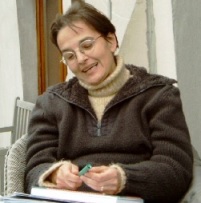
Ayse
Berktay, one of the founding members of the World Tribunal on Iraq (and
therefore a partner of the BRussells
Tribunal), a devoted peace activist and person of great integrity, is
arrested and imprisoned in Turkey.


and sign the petition
here
TURKEY: THE 'PROGRESSIVE' LAND OF REPRESSION
Turkey claims to be a successful democracy, but for thousands of
political protesters, it is anything but
by Ayça
Çubukçu, Lecturer on Social
Studies - Harvard University - Cambridge, Massachusetts
-
December 11, 2011,

|
Turkish riot police clash with Kurdish demonstrators in Diyarbakir,
southeastern Turkey, December 2009. Photograph: Ibrahim Yakut/EPA |
There is a growing disjuncture between those who promote modern-day
Turkey as a democracy and those who experience Turkey as a land of
arbitrary detentions, political repression and military destruction.
In the past two years, the Turkish state has imprisoned
thousands of its citizens under the
sweeping rubric of counter-terrorism operations. The recent wave of
arbitrary detentions known as the
KCK operations has cast such a wide
net that participation in a single protest or petition could constitute
evidence of an intention to commit terrorism – if not directly, then
certainly by association.
Today, even relatively privileged academic colleagues in Turkey face the
prospect of sharing the fate of Professor Büşra Ersanlı of Marmara
University, whose detention in October 2011 as an alleged terrorist was
proudly defended by the prime minister, Recep Tayyip Erdogan's Justice
and Development party (AKP).
Professor Ersanlı's imprisonment has received considerable attention in
Turkey and beyond, prompting
petitions,
protests, and
academic initiatives by her
colleagues and others concerned with the deteriorating prospects of
democratic politics in Turkey. Organisations such as Human Rights Watch
have
issued statements condemning
Ersanlı's arrest as "part of a crackdown on people engaged in legal
political activity with the pro-Kurdish Peace and Democracy party".
A political scientist by training, Professor Ersanlı is one among
thousands of Peace and Democracy
party (BDP) members – including elected parliamentarians, mayors,
students and intellectuals – who have been imprisoned on account of
their activism in support of the rights of Kurdish citizens in Turkey.
|
Arrested individuals being transported to their hearing in Diyarbakir as supporters look on. Image from hurriyetdailynews.com |
Some "progressive" commentators insist that Turkey, compared to many
other states, at least in the Middle East, is an example of a successful
democracy. Just observe, they suggest, the booming economy in the midst
of a global recession, the popular wedding of "moderate Islam" and
"secular" parliamentary politics and the emergence of an independent
Turkish foreign policy critical of Israel and supportive of democratic
forces in the Arab spring.
But is this the most that the peoples of Turkey, the Middle East and the
world could hope for? Why should contemporary Turkey constitute the
limit of our political imagination? Why should a state that parades its
"development" through drones it purchases from the US, a state that
imprisons professors, journalists, translators, lawyers, workers, and
students and treats as terrorists the members of a political party
representing millions of citizens – why should such a state be one to
promote or follow?
Last summer, at a cafe near Istanbul's Taksim Square, I met a dear
friend, Ayşe Berktay, a renowned translator, researcher and global peace
and justice activist. Having not seen each other for months, we chatted
as usual for a few hours about our families, lives and politics.
I am not sure when, if ever, Ayşe and I will meet at a cafe again. She
is now imprisoned for an unknown period of time.
My colleague Professor Büşra Ersanlı and dear friend Ayşe Berktay are
only two women among many other members and supporters of the BDP who
were imprisoned as suspected terrorists in October. Another wave of
arbitrary detentions followed in November, and yet others will certainly
come. Whether one chooses to call them "ordinary citizens" or
"activists", increasingly, politically engaged people in Turkey are
expecting that strangely familiar, five o'clock in the morning knock on
their doors.
This is only one reason why the widening gap between those who promote
contemporary Turkey as an example to be followed by the democratic
forces of the Arab spring, and those who experience the Republic of
Turkey as a threatening agent of political repression, is increasingly
troublesome.
At this historical moment, when daring political energies and creative
imaginations are at work worldwide – from Tahrir to Taksim Square, from
Damascus to Diyarbakir – we can demand much more than the example
officially offered by Turkey. To do otherwise would risk betraying not
only the future of democratic politics in Turkey and beyond, but all
those who have already paid dearly for that future through the
imprisonments, deaths, wounds and disappearances they have endured, even
welcomed, during long periods of military rule and parliamentary
politics alike.
source:
http://www.guardian.co.uk/commentisfree/libertycentral/2011/dec/11/turkey-progressive-repression
|
Ayça Çubukçu,
Lecturer on Social Studies, Harvard University - Research
Interests: critical approaches to human rights, international
law, and cosmopolitanism; postcolonial theory; global social
movements; citizenship and secularism; ethnographic methods; the
Middle East. At Harvard University, Ayça Çubukçu teaches on the
"Cosmopolitics of Human Rights" and the history of social and
political theory. She worked wiyh Ayşe during the preparations
for the World Tribunal on Iraq—a transnational anti-war
initiative that was launched in the aftermath of Iraq’s
occupation in 2003—whose culminating session took place in
Istanbul in June 2005. |
|
OPEN LETTER TO THE TURKISH AMBASSADOR IN BRUSSELS CONCERNING THE
ARREST AND DETENTION OF AYSE BERKTAY. |
Please read and sign the petition here |
|
To the attention of Mister İsmail Hakkı Musa, Turkish ambassador
in Belgium
Concerning: the arrest and detention of Ayse
Berktay-Hacimirzaoglu
Dear Excellency,
We have been informed that Ayse Berktay (also known as Ayse
Hacimirzaoglu) has been arrested on October 4th 2011and has been
in prison ever since.
Ayse Berktay is a partner of the BRussells Tribunal, and one of
the founders of the World tribunal on Iraq.
She is a devoted peace and human rights activist and does not
belong in prison.
We draw your attention the fact that an international petition
to demand her release (and of others) has already more than 6000
signatories worldwide.
http://www.ipetitions.com/petition/detentionsinturkey/signatures/page/102
We want to ask you to intervene urgently and do everything
possible for her immediate release. We join the international
calls (see underneath) for the release of publisher Ragip
Zarakolu and professor Büşra Ersanlı.
With utmost respect,
For the BRussells
Tribunal
prof. dr. Lieven De Cauter,
prof dr Patrick Deboosere |
APPEAL TO OUR READERS Write a letter to the Turkish ambassador in your country. The adjoining letter is send by the Belgian members of the Executive Committee.
(you can download a draft letter:
here)
|
Dr. Mahmoud Almsafir - December 2011

Cooperate with The Newsletter??
We are looking for translators:
Arabic
into
English
English
into
Arabic
English
into
French
English
into
Dutch
English
into
Spanish
English
into
German
Please contact us
FRIENDLY AND URGENT REQUEST:To ensure that you receive our next newsletter: please subscibe here. You can indicate in what language you want to receive it. Many thanks for your interest and solidarity.

Arrest George W. Bush for Crimes against Peace, War Crimes and Crimes
against Humanity !
Decline of Iraqi Women
Empowerment Through Education Under the American Occupation of Iraq
2003-2011



